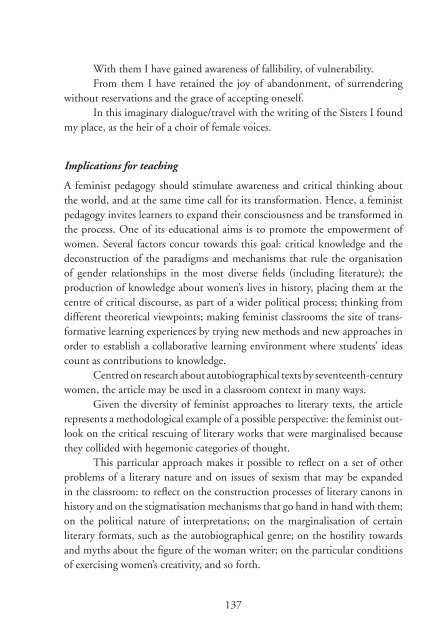Teaching Subjectivity. Travelling Selves for Feminist ... - MailChimp
Teaching Subjectivity. Travelling Selves for Feminist ... - MailChimp
Teaching Subjectivity. Travelling Selves for Feminist ... - MailChimp
You also want an ePaper? Increase the reach of your titles
YUMPU automatically turns print PDFs into web optimized ePapers that Google loves.
With them I have gained awareness of fallibility, of vulnerability.<br />
From them I have retained the joy of abandonment, of surrendering<br />
without reservations and the grace of accepting oneself.<br />
In this imaginary dialogue/travel with the writing of the Sisters I found<br />
my place, as the heir of a choir of female voices.<br />
Implications <strong>for</strong> teaching<br />
A feminist pedagogy should stimulate awareness and critical thinking about<br />
the world, and at the same time call <strong>for</strong> its trans<strong>for</strong>mation. Hence, a feminist<br />
pedagogy invites learners to expand their consciousness and be trans<strong>for</strong>med in<br />
the process. One of its educational aims is to promote the empowerment of<br />
women. Several factors concur towards this goal: critical knowledge and the<br />
deconstruction of the paradigms and mechanisms that rule the organisation<br />
of gender relationships in the most diverse fields (including literature); the<br />
production of knowledge about women’s lives in history, placing them at the<br />
centre of critical discourse, as part of a wider political process; thinking from<br />
different theoretical viewpoints; making feminist classrooms the site of trans<strong>for</strong>mative<br />
learning experiences by trying new methods and new approaches in<br />
order to establish a collaborative learning environment where students’ ideas<br />
count as contributions to knowledge.<br />
Centred on research about autobiographical texts by seventeenth- century<br />
women, the article may be used in a classroom context in many ways.<br />
Given the diversity of feminist approaches to literary texts, the article<br />
represents a methodological example of a possible perspective: the feminist outlook<br />
on the critical rescuing of literary works that were marginalised because<br />
they collided with hegemonic categories of thought.<br />
This particular approach makes it possible to reflect on a set of other<br />
problems of a literary nature and on issues of sexism that may be expanded<br />
in the classroom: to reflect on the construction processes of literary canons in<br />
history and on the stigmatisation mechanisms that go hand in hand with them;<br />
on the political nature of interpretations; on the marginalisation of certain<br />
literary <strong>for</strong>mats, such as the autobiographical genre; on the hostility towards<br />
and myths about the figure of the woman writer; on the particular conditions<br />
of exercising women’s creativity, and so <strong>for</strong>th.<br />
137

















